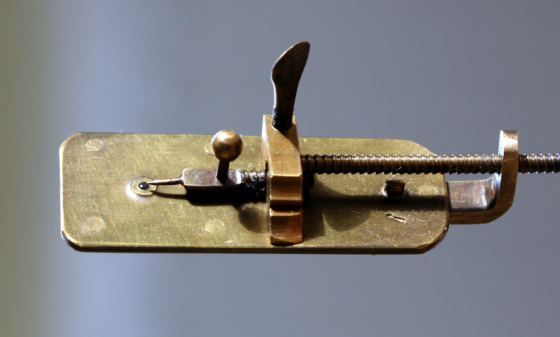Mystery of Van Leeuwenhoek’s microscope lens is partly solved


One of the mysteries of Antoni van Leeuwenhoek’s revolutionary microscopes has been revealed after 300 years, broadcaster NOS reported on Wednesday.
Van Leeuwenhoek (1632-1723), a pioneer in the field of microbiology and a supremely gifted craftsman, made lenses that magnified 60 to 260 times, a giant leap compared to the microscopes of his day which did not magnify more than 30 times.
The amateur scientist was notoriously jealous of his microscopes and went to some length to shield them from prying eyes. In 1711 he told a group of German nobles his lenses were the result of an advanced way of blowing glass.
Some 300 years later modern science tells a different story.
The Rijksmuseum Boerhaave owns four microscopes made by Van Leeuwenhoek but has always been reluctant to take them apart.
‘Van Leeuwenhoek secured his lenses between two metal plates which he fastened with nails. To take something so rare and of such historical value apart has never been an option,’ Tiemen Cocquyt, curator at the Rijksmuseum Boerhaave in Leiden, told the broadcaster.
New technology
Thanks to a new technology developed by Delft University of Technology, the microscopes can remain intact. Scientists were able to use a series of 2D images to build up a 3D image of the inside of the instrument showing that the lenses were not blown glass but ground, like the other lenses of Van Leeuwenhoek’s time.
Eight Dutch scientists who changed the world
‘It turns out there was no exotic production method,’ NOS quotes Cocyuyt as saying. ‘Van Leeuwenhoek was simply extremely good at grinding these tiny lenses.’
But not all the mystery surrounding the microscopes has been cleared up. ‘How he managed to grind his lenses so expertly is still a matter for conjecture,’ Cocquyt told NOS. ‘He probably used increasingly finer sand but even so his lenses are perfect and as good as is theoretically possible.’
The scientists are still in the process of investigating if the type of glass used by Van Leeuwenhoek is in any way special, NOS writes.
Thank you for donating to DutchNews.nl.
We could not provide the Dutch News service, and keep it free of charge, without the generous support of our readers. Your donations allow us to report on issues you tell us matter, and provide you with a summary of the most important Dutch news each day.
Make a donation